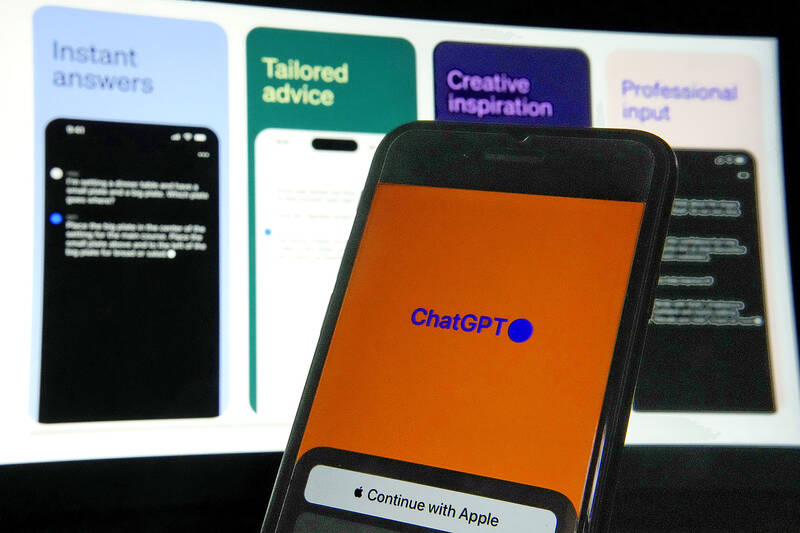It is job-finding season in Taiwan and thousands are nervously applying for jobs. One year ago, Chloe Tu faced the same situation. She had just resigned from her previous job and wanted to explore transitioning into the marketing industry. Little did she know that AI tools would become key to getting a job and to doing her job.
The problem was Tu had no education and no work experience in marketing. And at the time, no knowledge of AI tools. However, after gaining skills in AI and business communications at the International Trade Institute (ITI, full disclosure, I work for the government-run organization), she learned more about marketing, got a job in marketing and now uses AI tools every day to assist with her marketing communications.
This is a story of how Tu discovered AI as a career skill.

Photo: EPA-EFE
As for me, my AI career skill story started soon after ChatGPT was released in November 2022. As a teacher in Taiwan, I quickly realized the value of ChatGPT as a tutor and as a professional-level language assistant.
It was also clear to me that AI was a tool that could not only accelerate students’ learning but also enhance their productivity in their future jobs.
So, before Tu entered my classes early last year, I adopted an AI policy to ensure my students used AI tools to improve the quality of both the content and language of their business assignments, such as product presentations, case studies, and sales and negotiation role plays.

Photo: AP
In the following, Tu shares her learning experiences both before and after she found a job in marketing. She discusses the problems and benefits of using AI tools like ChatGPT and how they transformed her writing, working and thinking. Before entering my courses, Tu had never used AI tools and knew nothing about ChatGPT — similar to 47 percent of Taiwanese today, according to a study done by the government-sponsored Market Intelligence and Consulting Institute (MIC).
I hope Tu’s story, which she herself narrates below, will encourage more Taiwanese to learn more about the usefulness of these AI tools and see them as key career skills.
CHLOE TU’S VERSION
At the start of last year, I was 25 years old with little work experience, a recent degree in Foreign Languages and Applied Linguistics and a TOEIC score of 920. I was quiet and a little hesitant in speaking. Although I had a strong knowledge of English, I needed more practice and lacked confidence using professional English. Even more importantly, I lacked the knowledge and training in marketing to enter my dream job of digital marketer at an international company.
LEARNING WITH AI — PROBLEMS AND BENEFITS
I do not follow tech news or trends, so before I entered ITI, I had never tried AI tools. But after understanding how to write AI prompts to get the results I want, I used ChatGPT for almost every assignment. I really enjoyed the process of telling AI tools to do something, observing the response and modifying it to get a very impressive outcome. I would also discuss this with my teammates.
These AI tools helped me a lot and, in some ways, even changed my life. Before, I used [an AI writing assistant] to check my writing grammar, but it was not very helpful to modify the tone or vocabulary of my writing. But using AI tools was very helpful. With ChatGPT, my IELTS 6.5-writing ability immediately jumped to 8.5 or 9. I noticed how it changed certain phrases, grammar or vocabulary and improved my English.
And because I used it every day, I was reading a lot, getting corrected a lot and noticing certain phrases and grammar that frequently appeared.
These tools were so useful that I started to use them all the time. But this was a downside. I was depending on them too much and becoming less confident in my own English ability.
WORKING WITH AI
After leaving the ITI program, I immediately got a job as a marketing specialist at a company that provides technology news and research reports.
Since then, I have used ChatGPT up to 20 hours a week to help me brainstorm, write and revise marketing copywriting. It is now an essential tool to help me create a certain tone and to shorten sentences when I have a word limit, like for ads. My supervisor also encourages us to use ChatGPT, but I don’t see many other colleagues using it.
These tools, however, make mistakes. Once I did not double check a translation it made for me. Because I did not have professional knowledge in that field, I trusted the translation.
After my work was published online, the translation was criticized by someone who called my organization unprofessional for spreading incorrect information. Fortunately, my supervisor was understanding about this. But I felt ashamed. This taught me a valuable lesson and I now always double-check the language and translation from ChatGPT.
A challenge in using AI tools is prompting. These skills are crucial to getting the best results and it has taken me a long time and practice to get good at it. I have seen coworkers use ChatGPT and assume all you need to do is copy-and-paste text to get translated. But I have seen some of their incoherent and weird-sounding results. I told one coworker you have to have a good idea what outcome you want and specify the type of language and tone you want for it.
I confess that dependence is still an issue. I still feel a bit over-dependent on ChatGPT, but I now usually write shorter emails or messages myself and deliberately avoid AI. I think this is another part of AI learning — when not to use it.
If you asked me a year ago what career skills I needed, AI would not have been on my list. So, I am still surprised how important it has become in my job. I can generate impressive texts, summaries and charts quite quickly and save time. And with AI brainstorming, I think I also create better quality work than if I did it by myself — especially for more creative tasks like writing ads.
For people who need to write professional texts, perform analyses and come up with creative ideas, I think AI is an essential career skill.
AI AND GENERATIVE AI: CAREER SKILL
Tu’s story is instructive and relevant to many Taiwanese job-seekers today. A recent study from Taiwan’s Market Intelligence and Consulting (MIC) Institute found that only 36 percent of Taiwanese have used generative AI tools like ChatGPT, but 50 percent of 18-25-year-olds feel worried about how generative AI will impact their job opportunities.
They have reason to worry. A recent IMF study found that up to 60 percent of jobs in advanced economies like Taiwan will be impacted by AI.
Tu’s experience shows that generative AI should be a skill more people — especially younger generations — need to develop. It has already become a truism in many tech and corporate circles that while AI may not yet replace (white collar) workers, workers with AI skills will replace those without.
Or, job candidates with AI skills will outperform those without.
Several consulting companies and researchers have already demonstrated the positive impacts of AI tools on office worker productivity and quality, as Tu experienced for herself. A case study by the Nielsen Norman Group, for example, found that tools like ChatGPT improved employee productivity by an average of 66 percent.
However, this power can be seductive. For many AI users, it is a struggle to know when to use it and when not to use it. The MIC survey above echoes both my and Tu’s concerns about depending too much on AI tools: 64 percent of those surveyed worry about over reliance on these tools — which was the number one concern about these tools.
The challenge for individuals, organizations and schools is how to develop AI skills to improve human productivity and abilities. This is not an obvious or easy task. ChatGPT is intuitive and easy to use, but it does not come with a training manual to teach you how to use it well. Or, how to identify mistakes that it makes, as Tu and her coworkers learned the hard way.
But one thing is clear: the ability to use generative AI tools will make both job-seekers and workers become more productive employees who create better quality work. And this is why companies, managers and recruiters will inevitably focus more on AI as a career skill for all workers.

In the March 9 edition of the Taipei Times a piece by Ninon Godefroy ran with the headine “The quiet, gentle rhythm of Taiwan.” It started with the line “Taiwan is a small, humble place. There is no Eiffel Tower, no pyramids — no singular attraction that draws the world’s attention.” I laughed out loud at that. This was out of no disrespect for the author or the piece, which made some interesting analogies and good points about how both Din Tai Fung’s and Taiwan Semiconductor Manufacturing Co’s (TSMC, 台積電) meticulous attention to detail and quality are not quite up to

April 21 to April 27 Hsieh Er’s (謝娥) political fortunes were rising fast after she got out of jail and joined the Chinese Nationalist Party (KMT) in December 1945. Not only did she hold key positions in various committees, she was elected the only woman on the Taipei City Council and headed to Nanjing in 1946 as the sole Taiwanese female representative to the National Constituent Assembly. With the support of first lady Soong May-ling (宋美齡), she started the Taipei Women’s Association and Taiwan Provincial Women’s Association, where she

Chinese Nationalist Party (KMT) Chairman Eric Chu (朱立倫) hatched a bold plan to charge forward and seize the initiative when he held a protest in front of the Taipei City Prosecutors’ Office. Though risky, because illegal, its success would help tackle at least six problems facing both himself and the KMT. What he did not see coming was Taipei Mayor Chiang Wan-an (將萬安) tripping him up out of the gate. In spite of Chu being the most consequential and successful KMT chairman since the early 2010s — arguably saving the party from financial ruin and restoring its electoral viability —

It is one of the more remarkable facts of Taiwan history that it was never occupied or claimed by any of the numerous kingdoms of southern China — Han or otherwise — that lay just across the water from it. None of their brilliant ministers ever discovered that Taiwan was a “core interest” of the state whose annexation was “inevitable.” As Paul Kua notes in an excellent monograph laying out how the Portuguese gave Taiwan the name “Formosa,” the first Europeans to express an interest in occupying Taiwan were the Spanish. Tonio Andrade in his seminal work, How Taiwan Became Chinese,